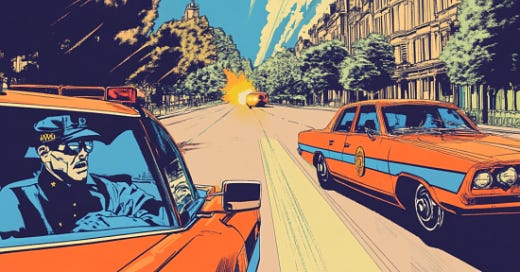Community notes
WhatsApp: we now have a Greater London Project community group! Click here to join for all the latest updates about what we’re doing, and to discuss ideas for London.
Diary: Put a hold in your calendar for June 2025, when SXSW, celebrating culture, creativity and technology will come to London for the first time!
Animal spotting: The artist Banksy has unveiled five new pieces across London this week, depicting the silhouettes of different animals - go take a look!
Jobs: London-based talent investors Entrepreneur First are hiring for a Head of Operations to execute their selection process and programme operations. And our friends at Works in Progress are hiring for Events contractors to support their events in London, NYC, DC or SF.
By Ben Southwood for the Greater London Project
Everyone in London has seen, or been a victim of, road traffic crime. And in most cases the crime has gone unpunished. It is unnerving to me, as a regular driver on London’s roads, how easy it is to get away with crime if you happen to be at the wheel when you commit it, how soon you will be back behind the wheel if you are punished, and how many drivers are on the streets with no tax and insurance. And of course, they are the drivers who tend to be the most dangerous.
In 2018 I was the first person at a crime scene by Bermondsey McDonald’s. My wife, a doctor, gave CPR and mouth-to-mouth to the man in the street until the ambulance arrived, but the man’s leg was detached, metres away, and he was dead. It turned out that a driver had blasted through a zebra crossing at about 50mph. We were stunned to discover that no one was charged. No one was even arrested!
A car tried to cut in front of my Uber on Clapham Road between Oval and Stockwell. My driver was not having any of it. Three passengers got out and ran to our windows. Hoods up and ‘Covid’ masks on they threatened to stab the driver if he didn’t get out of their way. The brave driver reluctantly backed down. I checked their numberplate as they drove away: of course, the car was untaxed and uninsured.
There are many, many other examples like my own, both in London and around the country.
Alan Moult deliberately ran over a cyclist that he believed spat on his Land Rover, leaving him with a broken pelvis and ribs. He was banned from driving for just three years. Lloyd McMurtary, driving without insurance, killed a 17-year-old cyclist, lied to the police that he had hit a deer, and yet was only disqualified from driving for 12 months. Crispin Tshibangu left a scooter rider paralysed from the chest down and needing 24-hour care for the rest of their life. He tried to pin the crime on his cousin, but will be allowed to drive again fewer than five years after committing the crime. Luqman Aslam deliberately drove a van into five pedestrians to get revenge. He was banned from driving for four and a half years. Christopher Harris murdered his girlfriend with a car while three times over the drink driving limit in 2018. His driving ban will end in 2025.
And these are the tip of the iceberg.
Each year over 1,500 Brits are killed in collisions with cars, and something like 29,000 are seriously injured – by contrast there are about 244 stabbing homicides each year and 26 deaths involving guns. Cars are amazing tools for getting around, but the smallest car in the UK, the Citroën Ami, is about half a tonne and can go at about 50 miles per hour. The heaviest electric SUVs, like the Mercedes EQS, are about three tonnes, and have top speeds well in the hundreds. They are dangerous when mishandled.
Yet causing death by careless driving carries only a 14.4 month sentence on average in the latest data. Causing death by dangerous driving carried a 57-month penalty on average. Manslaughters, by contrast, faced an average penalty of 102 months, while murders with knives understandably faced 294-month penalties on average.
Our prisons are so full that the PM is being forced to release prisoners even earlier than halfway through their sentence. So it’s understandable that we can’t give all of these violent drivers long custodial sentences. But why are we letting them drive again?
<><><>
These two issues are intertwined. In general, those committing serious crimes also commit many, many minor crimes. For example 54% of released murderers in Denmark commit other crimes after release, and 69% of them had committed other crimes before they were imprisoned for murder. Seventy-one percent of released Dutch murderers are convicted of another crime by ten years in. And this broad point applies particularly strongly to UK road crime. Those who are up to no good are particularly unlikely to insure their car – perhaps because one might as well be hanged for a sheep as a lamb.
Based on a question London Green leader Jenny Jones putto the Mayor in 2008, something like 1 percent of London cars are illegally driving without tax. The Motor Insurers Bureau found that about 1 percent of UK cars are (illegally) uninsured as well – probably the same ones.
About eight percent of those killed on the road each year – 130 people – are killed by that one percent of uninsured drivers. According to West Mercia Police, uninsured drivers are also ten times more likely to be a convicted drink driver, six times more likely to have a defective vehicle, and five times more likely to get caught speeding by cameras. Clearly not all serious car crimes are committed by those driving without insurance, but a significant fraction are.
<><><>
What makes this especially notable is that there is an easy way we could make a big difference to the number of uninsured and untaxed drivers on London’s streets, making the roads safer for other road users. You will already know that there are about 2,000 cameras around London, which use automatic number plate recognition (ANPR) to enforce the congestion charge, ultra-low emissions zone, and more. They’re also accessible by police.
Police cars have their own cameras. If one of the police cameras sees an uninsured or untaxed car it pings the policeman automatically and they can decide whether to pursue and stop it. But the vast majority of cameras, the non-police cameras that you go past every day on London’s roads, don’t alert them: they just pump the data (which numberplates were where) into a database.
To be clear, the police are allowed to access this information, they just don’t get sent it by default1. If they did manually pore over the records they would find all the uninsured and untaxed drivers driving around, plus those previously used for crimes, and those with suspicious plates. But by the time they did that the car would be long gone, so in practice the perpetrators get away with it practically every time. What the Met need is an automatic ping, like they get with their own cameras.
This could go beyond telling police where uninsured drivers are going. Cloning number plates is itself a crime, but it is also only useful if you are trying to cover up another crime by pretending to be someone else, so picking up those driving with fake numberplates could help prevent many other crimes. It would only take a simple predictive system, which looked at where the car was registered, and where it had last been tracked by cameras, to identify and rapidly investigate suspicious cars.
Fixing this would not solve all our problems on its own, and wouldn’t work properly unless the police, courts, and Crown Prosecution Service all had the capacity to pursue these crimes. Prison sentences would be helpful, but we may not even need them: just keeping dangerous drivers out of their cars with longer driving bans and smarter camera enforcement could make a huge difference
Read of the week:
One from the archives: in June 2008, Paul Graham wrote about Cities and Ambition. Paul is an amazing writer, for example: “The Impressionists show the typical pattern: they were born all over France… and died all over France, but what defined them were the years they spent together in Paris”.
There is one exception: when cars are stolen. When a a car is marked as stolen, then the police central control room is informed when it goes through an ANPR camera. In effect, I am proposing we extend and improve this system.





